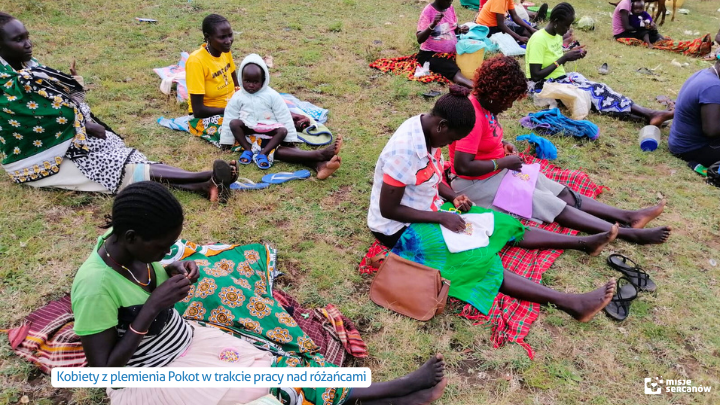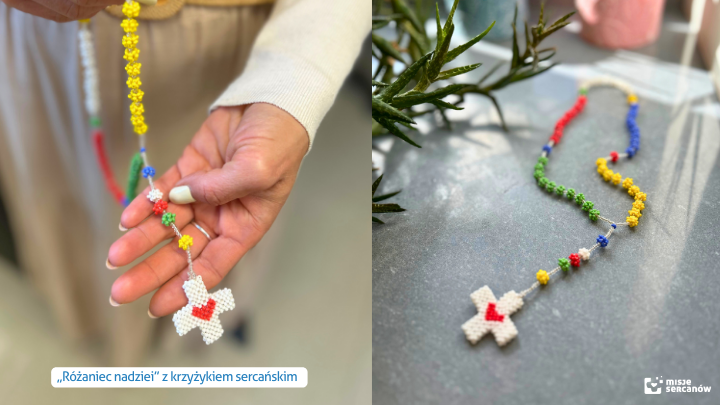In Kenya, Comboni missionaries have spent decades bringing not only the Good News, but also tangible support. Through their presence and dedication, they are transforming the daily lives of local women from the Pokot tribe - offering them a chance for dignity, independence, and personal growth. This story began under a tree, and continues to this day.
For more than forty years, the Comboni Fathers have been preaching the Gospel in Amakuriat, in northwestern Kenya. From the very beginning, they have worked to help the people of the Pokot tribe come to know and love God. At the same time, they have been committed to ensuring that the people of this remote region have access to honest work and a decent income.
Years ago, Sister Amelia from Italy took special care of the local women. She would sit with them under a tree, teaching practical skills essential for everyday life. The women were illiterate and did not speak Swahili, Kenya’s official language. Sister Amelia taught them how to read and write, to speak Swahili, and even to count. She wanted the women to be able to earn a living on their own, so she also showed them how to sew and make ornaments using small, colorful beads.
The women quickly learned to make rosaries, bracelets, belts, necklaces, pendants, and earrings, which they sold at local markets to help support their families. Inspired by Sister Amelia’s work, Father Maciej Zieliński, a Comboni missionary from Poland, launched the “Rosary of Hope” project. Its goal is to help women from the Pokot tribe earn a fair wage for their craft.

Life among the Pokot tribe remains very modest, and illiteracy is still widespread. Men spend most of their day herding cattle, and children also work. Boys tend cows, goats, rams, and camels, while girls help around the house - cooking, cleaning, doing laundry, and fetching water. Every morning, the women prepare breakfast for the family: hot tea with milk and plenty of sugar. Several times a day, they set out to fetch water, often walking several kilometers and returning with 20 liters balanced on their heads. In addition to their daily chores, they also collect firewood and cultivate small plots of land, when possible during the rainy season, which lasts only three to four months a year.
During the dry season, when fieldwork is not possible, the women make rosaries from colorful beads. It’s an activity that requires focus, patience, and precision. Completing a single rosary takes three to four hours. The women usually work together, sitting under a tree - not just as a time for work, but also as a chance to meet, talk, and share experiences. Today, around 400 women are part of the project.
Making rosaries gives them a sense of purpose. For many, it’s their only source of income - a job that allows them to support their families, repair their huts, buy food, or pay school fees for their children. Some save money with the hope of opening a small shop; others have been able to complete their education thanks to their work with the rosaries.
Each rosary is carefully inspected. “Controllers” make sure it has the correct number of beads and the proper color pattern. They check the quality of the craftsmanship in detail. If a mistake is found, the rosary is returned to its maker for correction. Only then does she receive payment. In this way, the Comboni missionaries combine the preaching of the Gospel with a touch of concrete economic support.
-1758705730.png)
Claudina - pictured holding a rosary - was raised in a simple culture, but she always dreamed of more: school, education, and travel. Four hours of patient work on each rosary helped make those dreams come true. Today, she is studying at university. Her mother, also a rosary maker, now runs a small shop that helps pay for the schooling of the other children.
Deputy Secretary of for Foreign Missions
of the Priests of the Sacred Heart in Poland
Fr. Piotr Chmielecki SCJ
The rosaries prepared with our donors in mind are truly unique. Each one is finished with a Dehonian cross - a symbol of the love and sacrifice of Jesus, who gave His life for us on the cross.
These rosaries are made in the colors of the missionary rosary, where each color represents a different continent: red stands for the Americas, yellow for Asia, green for Africa, blue for Oceania, and white for Europe.
This particular rosary is not only a tool for prayer. It is also a sign of solidarity with missionaries and a prayer for peace and the evangelization of the world. The colors help focus intentions on specific regions, making prayer more personal and intentional.

By purchasing a “Rosary of Hope,” you support the women of the Pokot tribe, enabling them to provide for their families and giving hope for education and a better future for their children.
If you would like to receive a rosary from Kenya, please make a donation of €10 to our missionary account with the note: “Rosary of Hope.” If you wish to order more than one rosary, please indicate the quantity in the transfer reference.
We also welcome higher donations - any additional funds will go directly to supporting the women of the Pokot tribe.
Of the amount donated:
- €8 covers the salary for the woman who made the rosary,
- €2 covers the shipping costs.
Bank account numbers for money transfers are:
For $: PL 52 1600 1462 1847 3641 5000 0009; SWIFT: PPAB PLPK
For €: PL 41 1600 1462 1847 3641 5000 0013; SWIFT: PPAB PLPK
For others: IBAN: PL 79 1600 1462 1847 3641 5000 0008; SWIFT: PPAB PLPK
Title: Rosary of Hope + number of pieces



